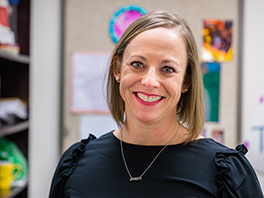For the Love of Teaching
Zolkoski Champions for Classroom Change
 Dr. Staci Zolkoski always dreamed of becoming a primary teacher. As a child, she played
“school” with various stuffed animals in her bedroom. Zolkoski eventually made her
dream a reality and taught kindergarten and fourth grade for a combined seven years.
Along her educational journey, a professor encouraged her to obtain a doctorate, and
as Zolkoski says, “The rest is history.”
Dr. Staci Zolkoski always dreamed of becoming a primary teacher. As a child, she played
“school” with various stuffed animals in her bedroom. Zolkoski eventually made her
dream a reality and taught kindergarten and fourth grade for a combined seven years.
Along her educational journey, a professor encouraged her to obtain a doctorate, and
as Zolkoski says, “The rest is history.”
“Never in my wildest dreams did I imagine teaching at the collegiate level,” said Zolkoski, a UT Tyler assistant professor of special education. “Now I get to make a broader impact and help my students become the best possible teachers they can be for their future students.”
Her area of expertise includes special education, particularly working with students with emotional and behavioral disorders. While she was a grade-school teacher, her classes were inclusion-based, meaning she worked with children with disabilities as well as special education teachers and paraprofessionals. While a graduate student, she learned about Social and Emotional Learning, or SEL – a proactive approach for supporting children that increases emotional and mental well-being.
“Research continues to show that zero tolerance policies do not work, but building positive environments where students feel like they are cared about does work,” she said. “I remember thinking SEL was amazing and hoping to get the chance to help in that way some day.”
SEL involves a person’s ability to understand, manage and regulate their emotions, Zolkoski said, noting that there are five competencies including self-awareness, self-management, social awareness, responsible decision-making and relationship skills. Studies have shown an 11 percent gain in academic achievement of students involved in an SEL program, compared to students not involved in one, she added.
At UT Tyler, she is researching ways in which SEL can help better student experience within the primary and secondary classroom, and sharing that knowledge with area teachers, counselors and parents. With her training in both general and special education, Zolkoski sees the value of SEL. She specifically finds ways of promoting resilience through protective factors such as creating positive learning environments and involving parents and families in education – all while implementing SEL.
“Academics are important, but we can’t get to the academics without recognizing and supporting what is happening with the whole child,” Zolkoski said, “and SEL improves classroom behavior, which in turn supports teachers. It is time to make a positive change, and I love being a part of that process.”
Getting SEL in schools to support students and teachers is even more important now – especially during this time of increased trauma, violence, mental health issues and bullying in schools, Zolkoski noted. “Suicide is the second leading cause of death for adolescents, and this isn’t OK. We have to do something to change this, and SEL can help. Rather than focusing on the negative outcomes of students, let’s flip the switch. Let’s focus on the positive, become proactive and figure out the best ways to help kids be successful in life,” she said.
Zolkoski talks to educators who implement SEL to learn their perspective. She also collaborates with other educators nationwide who conduct quantitative research by using surveys. She stresses the importance of caring teachers, noting that students generally want to feel their teachers care about them and their education.
“Once we learn the ‘why’ of behavior, we can begin helping the students,” she said. “Getting to know them and their family members makes it easier to learn the ‘why.’ Students also perform better when they are educated in a positive learning environment. If we all think about it, each one of us could say we respond better in an environment that is more positive, where we feel valued and cared for.”
Zolkoski enjoys working in the College of Education and Psychology because of her “rock star” colleagues and research partners, as well as her students, who push her to be the best educator possible.
“I feel beyond blessed to do what I do,” she said. “It is truly my goal in life to support others in any way that I can, and UT Tyler and the CEP leadership have given me that support to do just that. I wouldn’t be where I am today without it.”
Zolkoski teaches both undergraduate and graduate UT Tyler courses in special education, including managing and instructing diverse learners, classroom management, educational strategies, behavior disorders and special education law. Outside of work, she enjoys spending time with her family and friends.
#CEP
Read more from the March 2021 issue!
- Supporting Teacher Education: UT Tyler Receives Funds for Partnership
- From UA to UT Tyler: University Academy Alums Soar as New Patriots
- Shining STAR: Barnett Receives System Award to Enhance Mental Health Research
- Educational Card Game Wins UT Tyler Idea Challenge
- UT Tyler Launches Project to Provide Mental Health Support for Teachers
- Enhancing Education: UT Tyler Awarded Gift from CTCU to Support East Texas Teachers




